Abstract
Homeschooling has become a more debated topic nowadays, both as a consequence of the COVID-19 pandemic where education took place at home, but as well as a result of the informal existing initiatives on homeschooling in Romania, where Romanian students were enrolled in different international homeschooling umbrella schools. The study seeks to find out parents’ attitudes and interest regarding the homeschooling education in an effort to observe the societal tendency and educational policies in relation to the homeschooling phenomena. In order to observe parents’ perception on this matter an online survey was applied in the month of June 2022. The study reveals which are the internal drives that would make parents enroll their children in a homeschooling alternative. A specific look is given to the relationship between important pedagogical concepts, such as: e-learning, online and asynchronous learning and homeschooling. In addition, an important is given to the educational legislative framework of Romania in order to observe how this educational dimension matches with the legislative documents in order to offer recommendations. The results of the study are useful for decision-makers to improve the existing education policy and highlights the general characteristics of this educational alternative in relation to the parents’ attitudes.
Keywords: E-learning, education policy, homeschooling, parents
Introduction
Homeschooling is relatively a new concept introduced in the field of education sciences, which could be defined as "studying that takes place at home" (Neuman, 2020, p. 1). As of 1970, homeschooling became a critical topic for the American society, with parents being strong advocates of this system, hence leading to a political movement, named the “homeschooling movement”. As a consequence of the massive discussions within American society about the nature of homeschooling and its relation to formal education, the system got its legal foundations and more and more parents opt for the homeschooling system (Gaither, 2008; Knowles et al., 1992). Nowadays, parents not only in the United States can opt for the option to enrol their children in a homeschool system, but rather in the vast majority of the countries of the Western world, with each state having its own recognition process, curriculum implementation and general quality assurance criteria (Gaither, 2008). However, homeschooling practices, where education was done at home, is not necessarily a new pedagogical practice but has deeper historical roots. Throughout times, important historical figures followed their education at home, Franklin D. Roosevelt, Woodrow Wilson, Abraham Lincoln (Davis, 2011). Thus, scholars consider that homeschooling is rather a comeback to an older model of education, where students were engaged in home activities under the coordination a tutor, whose role was not only purely pedagogical, but also they had the purpose of infusing elements of culture and tradition (Guterman & Neuman, 2017). At the same time homeschooling could also be perceived as a concept which brings together other pedagogical concepts, the main difference being in the way homeschooling is realized, including here: distance learning, e-learning and asynchronous learning.
Problem Statement
Empirical studies on the matter present the reasons why parents decide to choose the homeschooling system detrimental to public education, some of the reasons underlined by scholars are as follows: to create stronger family bonds (Lyman, 1998), the idea that the family is a superior place to learm (Knowles et al., 1992), but also socio-cultural ones (Clark, 1994). Sociologist Van Galen creates, in relation to the attitudes of parents’ who homeschool their children, a dichotomy in terms of sets of believes by dividing them into ideologues, and pedagogists. Firstly, ideologues refer to those whose values do not match with the values that the school promotes, and offer homeschool education based on conservative and fundamentalist values. Secondly, diametrically opposed to the ideologues, are the pedagogues, parents who want to compensate for the shortcomings of the school by creating educational contexts beyond the formal curriculum of the state. When it comes to the relation between parents’ perception and the homeschooling system, few studies tackle the matter, and not even few study the perceptions and attitudes of Romanian parents. Some studies showcase that when it comes to the reason why parents decide to enrol their students in this alternative, there could be found a series of factors that facilitate in making the decision, as follows: the negative side of socialization within the peer group, religion, a child’s special needs, parents’ negative experience with the school, lack of administrative support from the side of the school, or an incident at school where the child was involved (Olsen, 2008).
At the same time, the National Centre for Education Statistics in a report from 2019, called outlined that they found three main reasons why parents opted for home-schooling, as follows: the safety of the school environment 34% of them, followed by the dissatisfaction with the academic institutions 17%, followed on the third place by the desire to follow a religious instruction, which scored 16%. (National Centre for the Education Statistics). At the current point, the Romanian Education system through the National Education Law no. 1/2011 does not recognize homeschooling as an official educational alternative for which parents could opt for. Albeit, article 52 of the National Educational Law provides a general framework for the running of “home education” and “hospital education”. The article states the following: “For children, school students and youth, who for medical reasons or caused by a disability, or immobilized, education at home takes place, on a defined period of time” (Romanian Parliament, 2011). What could be observed lately is the societal tendency of Romanian parents to enrol their children in different international schools which offer homeschooling opportunities for those enrolled. In this case, those who decide to take follow their education in an international “umbrella school” are officially considered in the situation of early school leaving and their option is not registered elsewhere, but only at the level of the international school or at the level of the system on which the international school is based. Through this paper we want to investigate which are the Romanian parent’s attitudes in relation to homeschooling in order to give a clear overview on how this system is perceived by the parents.
Research Question
Taking into consideration the fact that homeschooling became a topic of interest nowadays, as a consequence of the waves of parents who decided to enrol their children into international “umbrella schools”, where parents’ attitudes and beliefs in regards to the homeschooling system played an important role, through our study we want to answer to the following question: How is the homeschooling system perceived by the Romanian parents under the aspects of attitudes, sets of beliefs, willingness of adherence?
Purpose of the Study
The purpose of this study is to identify the Romanian secondary school students parents’ attitudes and beliefs of the homeschooling system in relation to the format, scope, modality of realization in order to give a clear imagine on how the parents perceive this system.
Research Methods
For the purpose of this research, a questionnaire designed by us was applied in the online format, targeting the parents/ legal representatives of the school students from secondary education. Consisting of a number of 12 questions, through this questionnaire we could collect various data in relation to the parents’ attitudes towards the homeschooling system (see Appendix A). By utilizing this methodological instrument, we reached a sample of 465 parents, coming from both urban and rural areas. The vast majority of the participants in the study come from the urban area, as it can observed in table 1, whereas only 14,4% of parents/ legal representatives come from the rural area.
In relation to the gender of the participants in the study, females are at a percentage of 78,4%, where males represent only 21,7%, as it can be noticed in Table 2.
The subject of the research, the parents and the legal representatives of school students, mainly come from the age range of 40+ years old, with a value of 48, 0%, while the age range of 31-40 is represented at 39,9%, and only 21,7% are between 20-30 years old (see Table 3).
Findings
Most respondents to the survey point out the three main reasons for which they would enrol their children in the homeschooling alternative, as follows: physical deficiencies, school bullying and the dissatisfaction with the quality of education. On the contrary, only few participants in the study chose the religious beliefs as a reason for which they would enrol their children in homeschooling system, but also few of them mentioned considered school students’ special needs as a reason (see Figure 1).
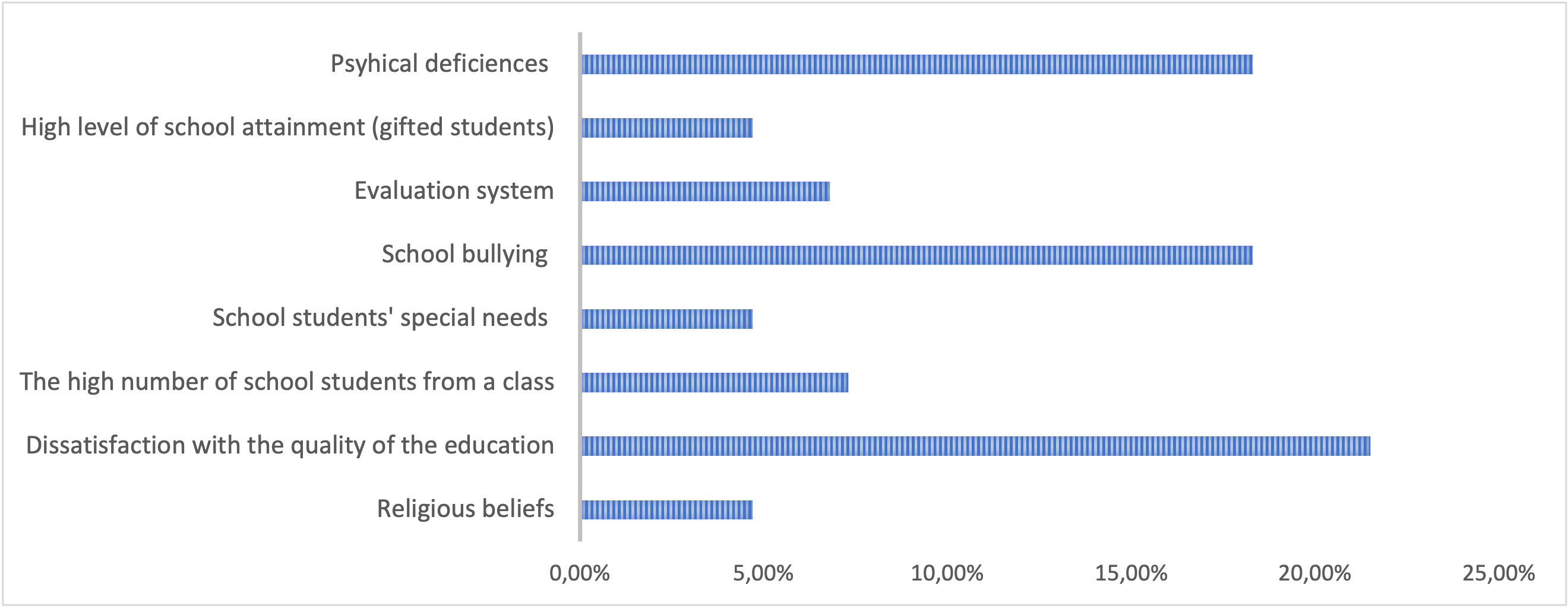
The participants in the study, the vast majority of them, deemed that the best way in which the homeschooling system could be implemented, in the eventuality of it having legal basis, is either through a hybrid format of homeschooling, where teaching is done a period of time at home, and a period of time at school, with 34% of the subjects of the study agreeing with this option. Moreover, 33% of the participants in the study believe that the implementation of homeschooling could be done by a teacher at home (see Figure 2).
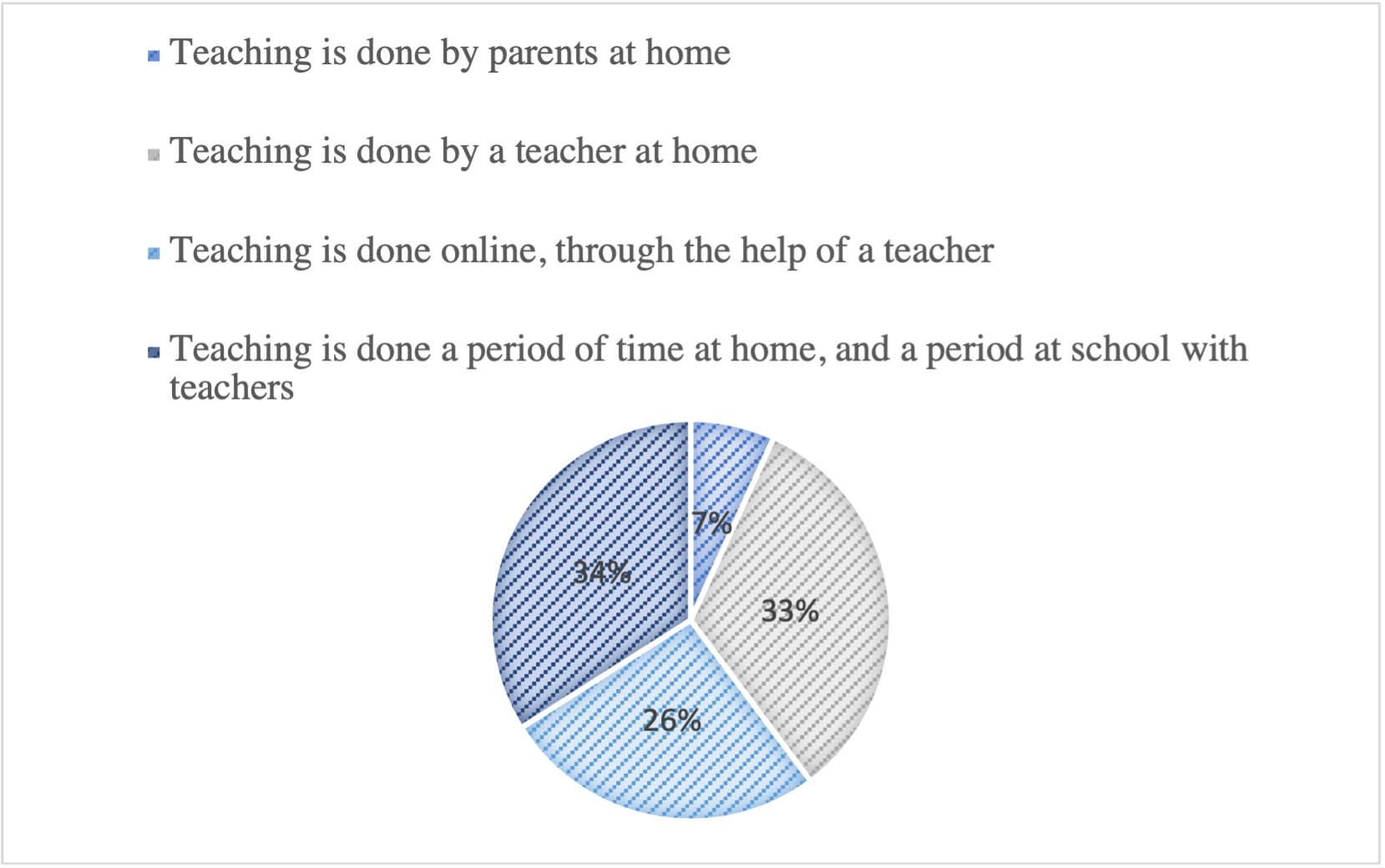
When it comes to the advantages of the homeschooling system, from the perspective of the parents, the two main advantages of the homeschooling system are: reduction in the stressed caused by the school, but also the freedom in the school schedule. At the same time, around 20% of the parents questioned in the research, mentioned that homeschooling also proves a way for learning efficiency (see Figure 3).
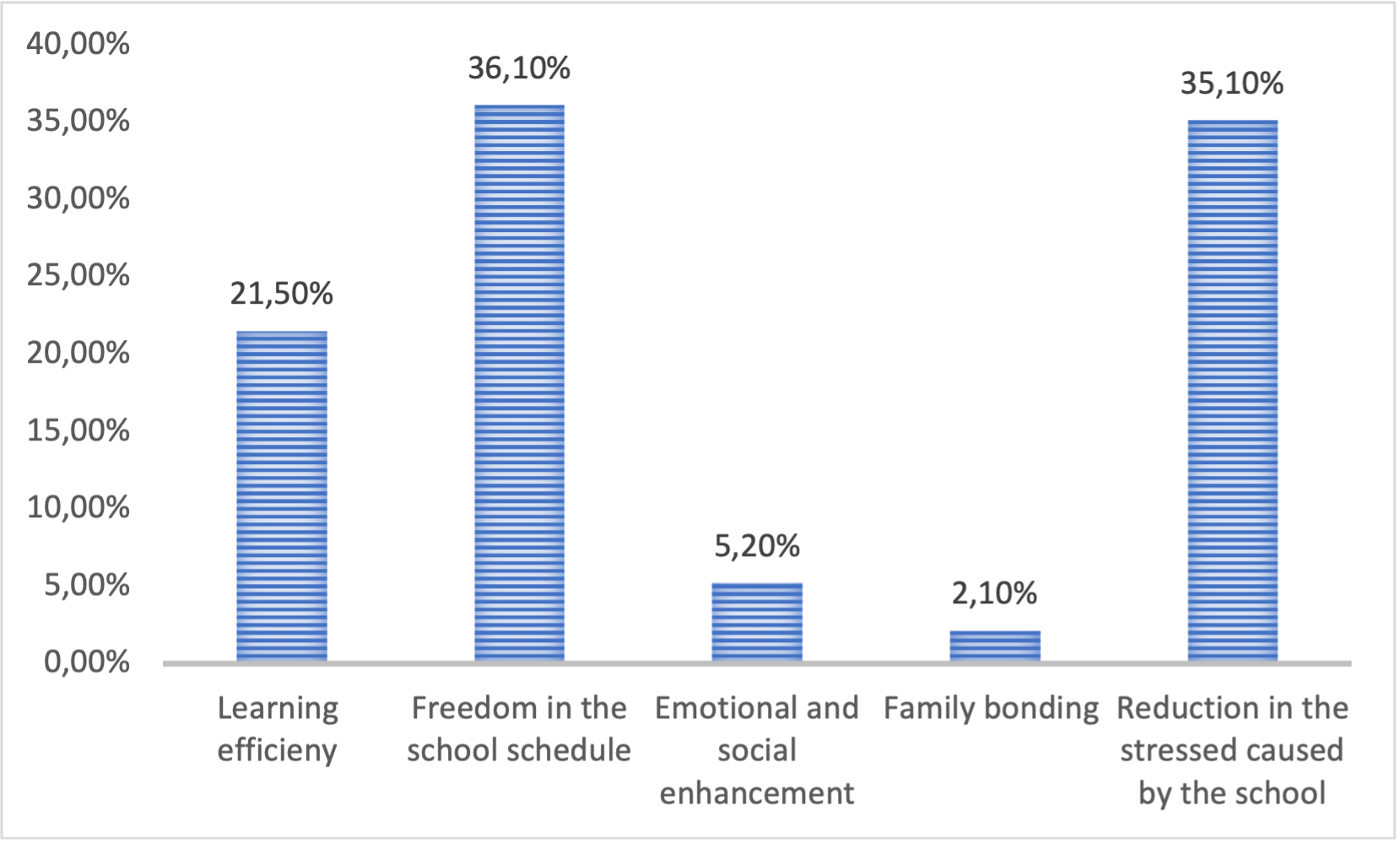
From the perspective of most parents, as indicated in the below Figure 4, the crucial minor disadvantage that the homeschooling could have over the school students is in terms of the lack of socialization, with around 65% of the parents considering that this is the major issue of this system. On the other side, it is interesting to mention that out of 465 parents/ legal representative who took part in the research, none considered that the high cost of instruction material would be a problem.
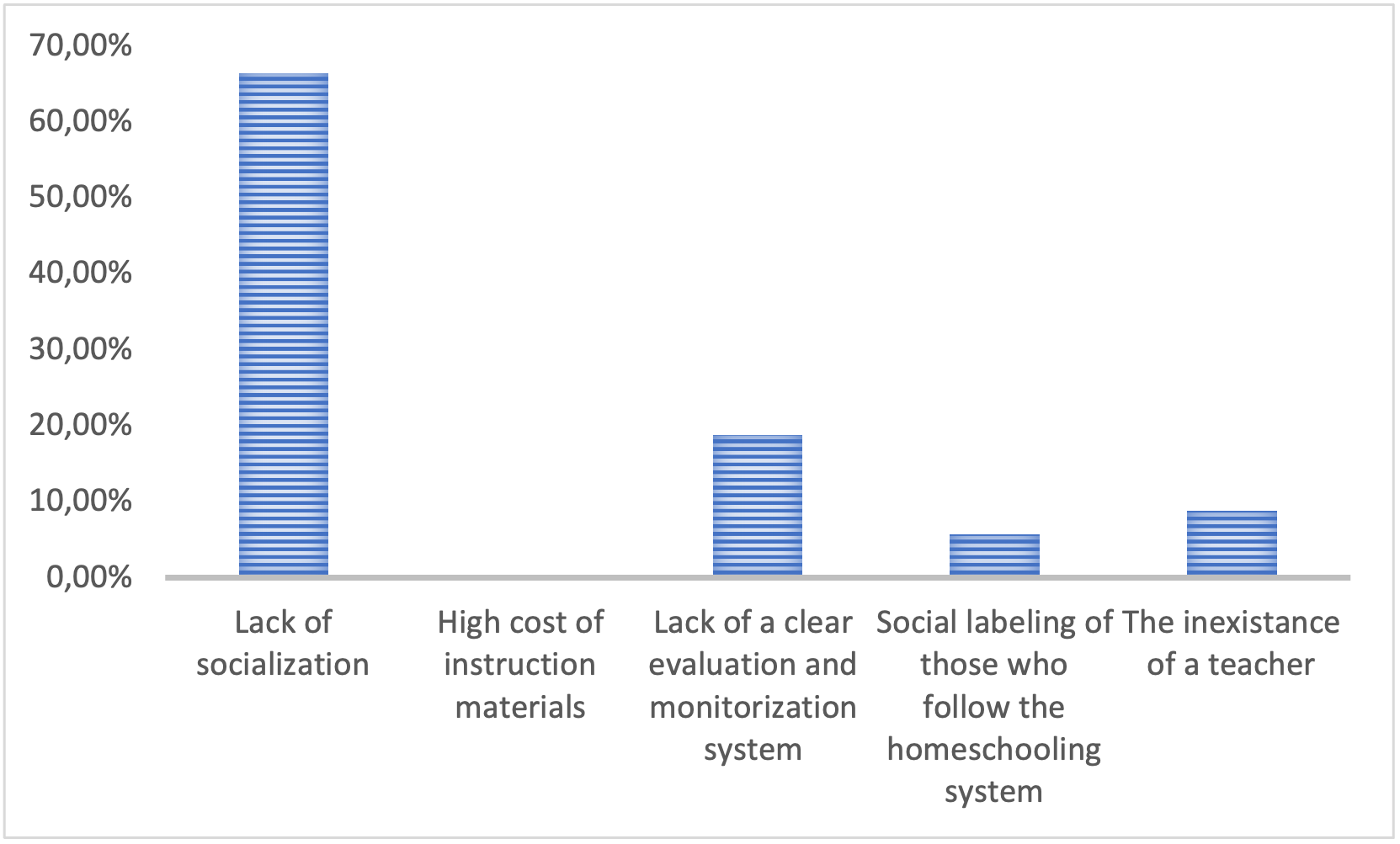
Based on the Figure 5, many of the parents who participated in the research, 67% of the respondents to the survey, believe that for the students with special needs (gifted, deficiencies, syndromes etc), there should be the possibility of the homeschooling system, as an alternative to education in schools.
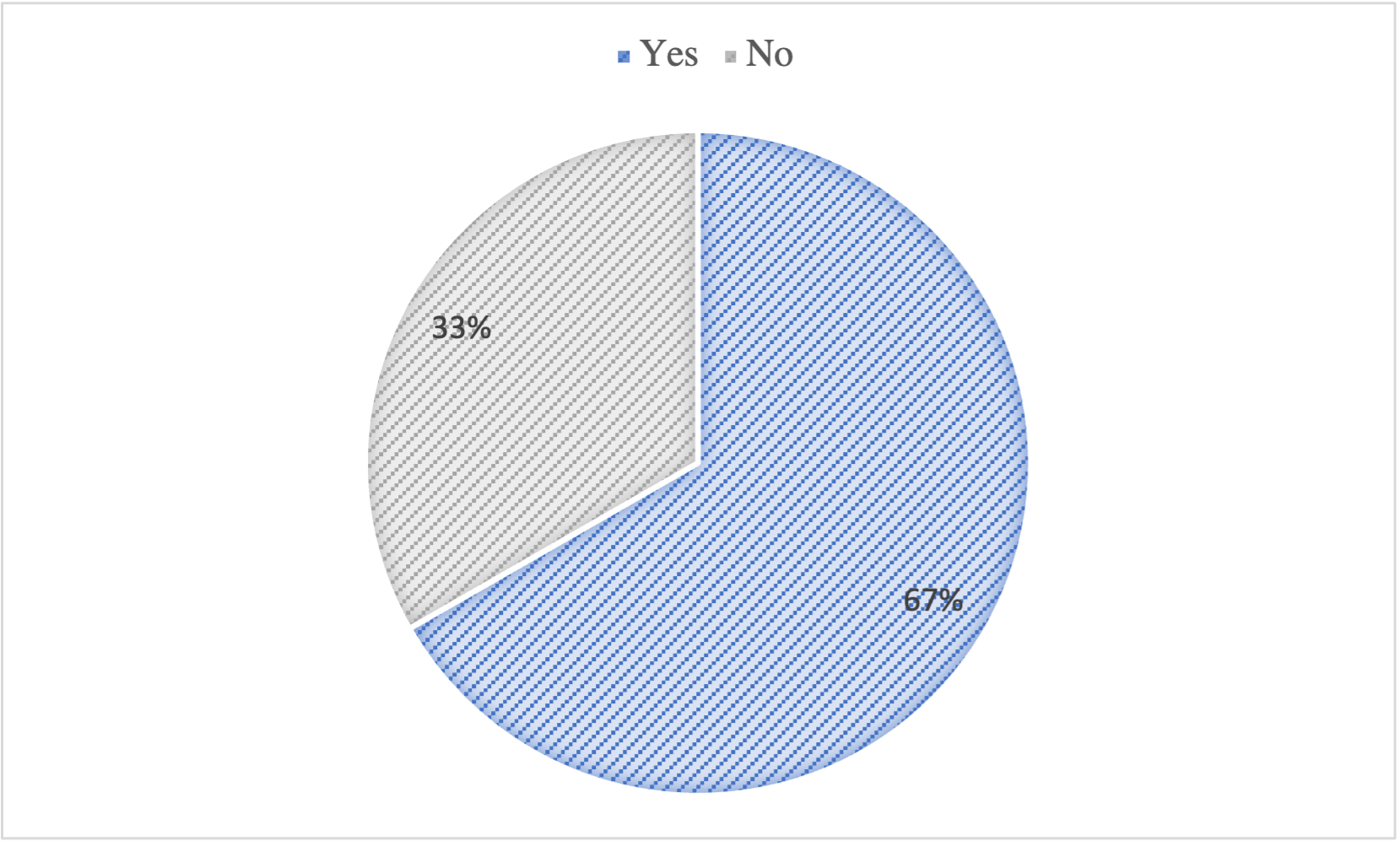
When asked if there should be the possibility of enrolment of all students within the homeschooling system, as an alternative to the existing education in schools, the vast majority of parent, with a percentage of 64 believe that this should not be a legal option. On the other hand, 36% of parents believe that all students should have this possibility (see Figure 6).
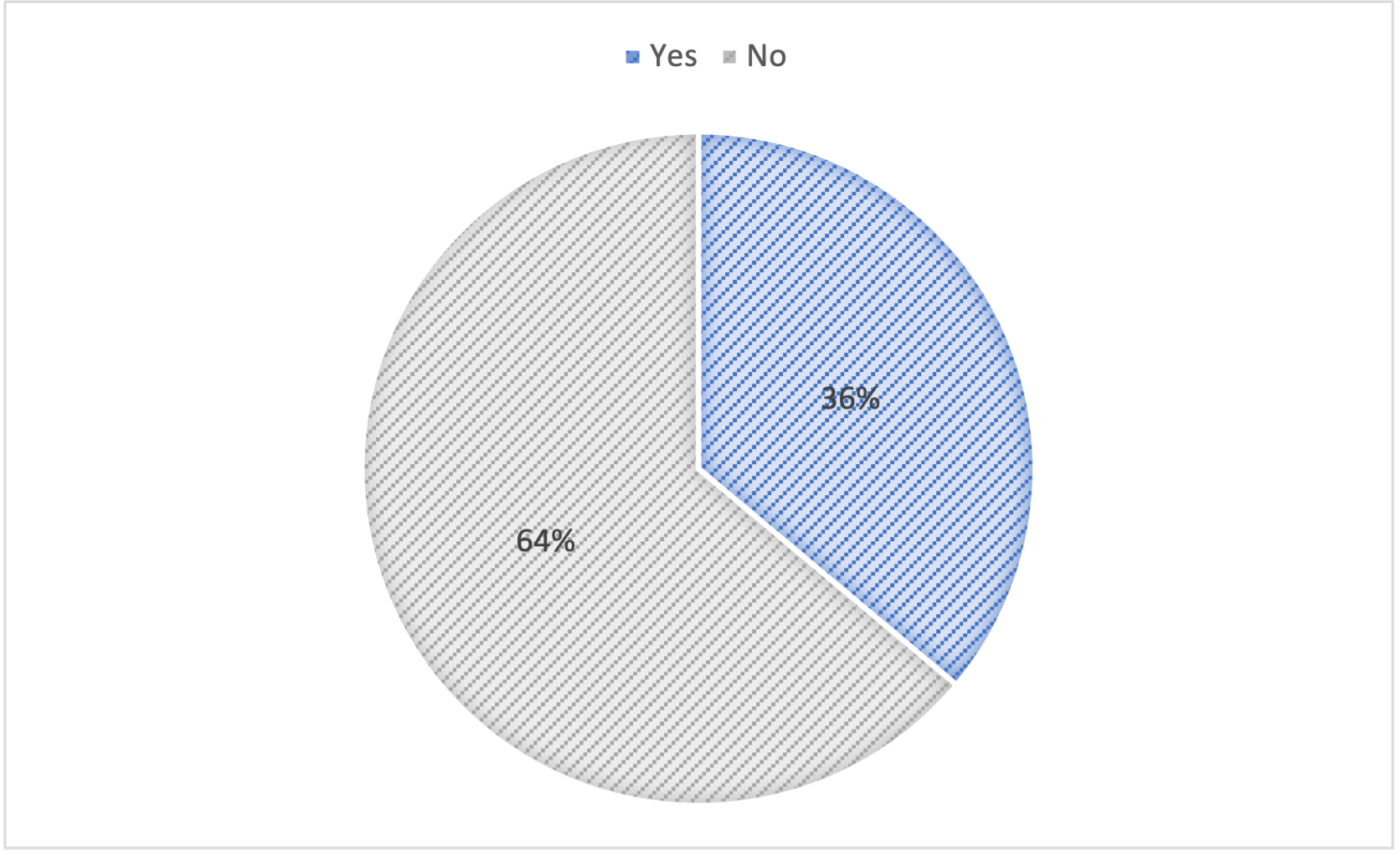
As a consequence of the COVID-19 pandemic, education moved in the online setting, with classes taking place on different educational platform, with school students having the classes at home. In relation to this social phenomenon, the parents were asked if, as a consequence of the global pandemic, they considered that homeschooling should be an alternative in the Romanian educational system. Therefore, based on the data from the survey, what can noticed is that 43% believe that the pandemic made them think that homeschooling should be an option that it could be introduced in the educational system, where 59% of respondents said that the pandemic did not have an impact on assuming that homeschooling should be an alternative in Romania (see Figure 7).
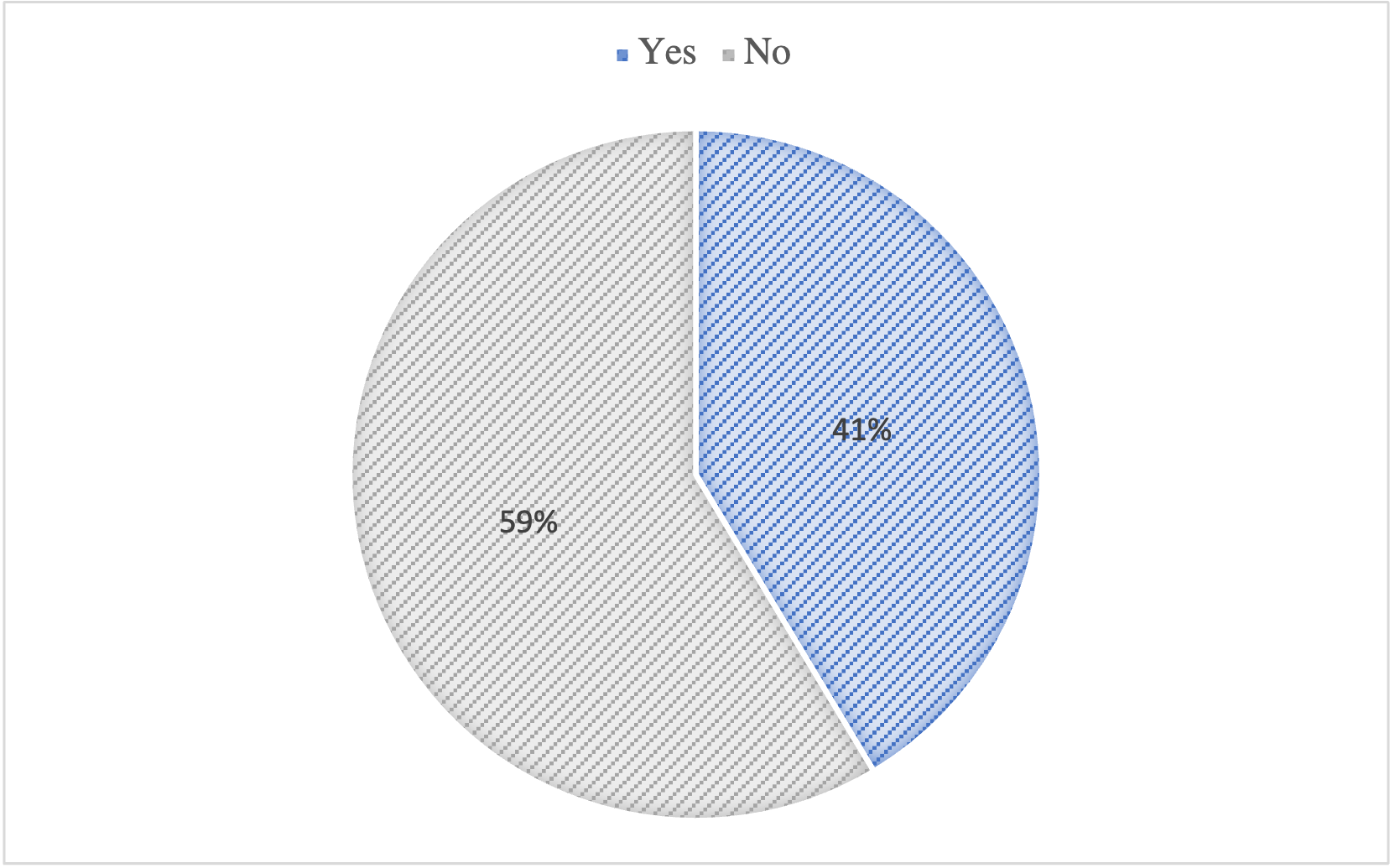
The last question of the survey looked into the parents’s willingness to enroll their children in a homeschooling alternative, in the case it has a legal basis and concrete ways of implementation. Based on the survey applied, as it can be seen on the Figure 8 from below, only 31% would consider enrolling their children in a homeschooling alternative, and roughly 69% of them would not consider enrolling their children in the homeschooling alternative.
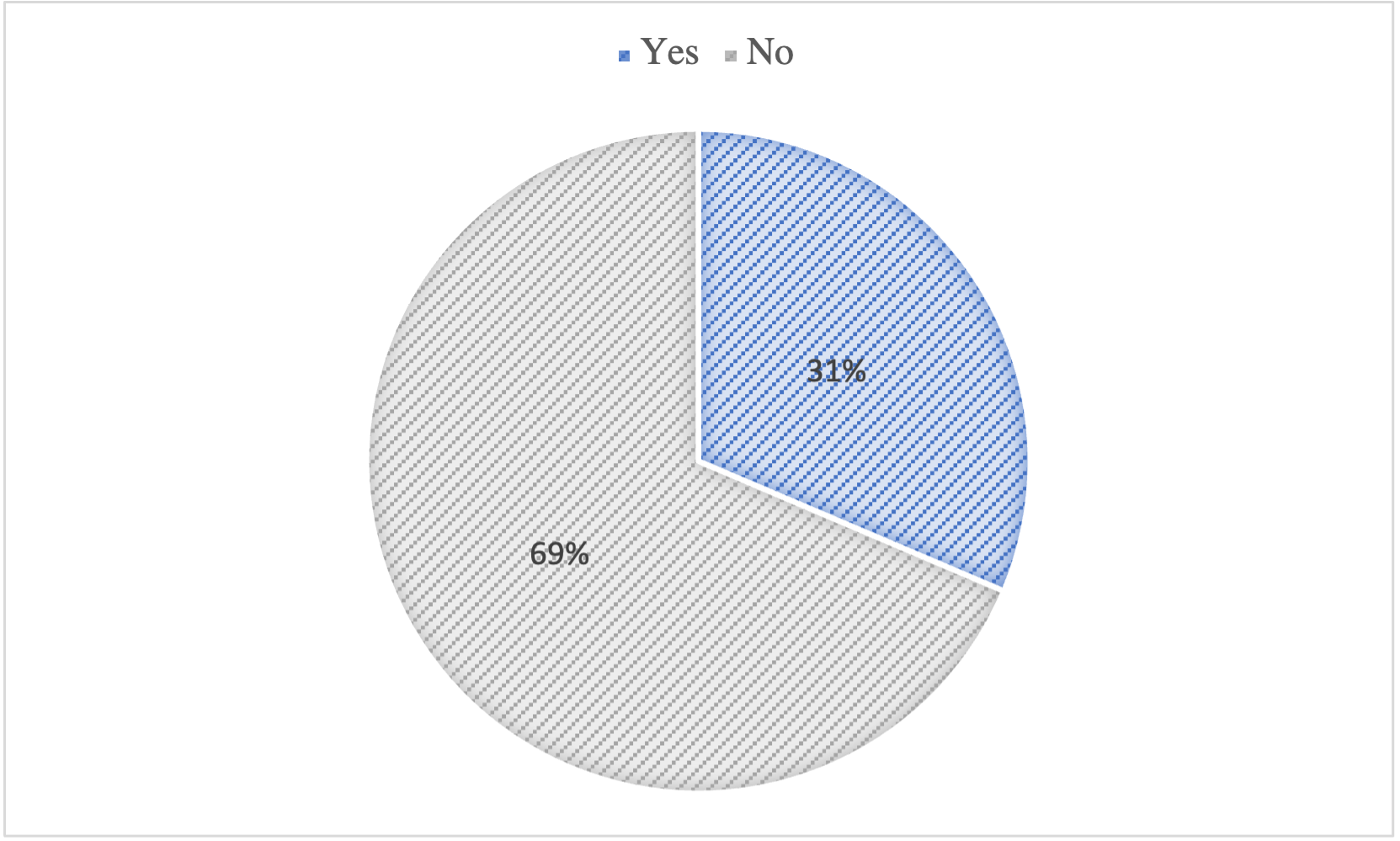
Thus, based on the existing figure, what we can observe is that parents do not necessarily envision themselves taking this decision of enrolling their children into the homeschooling alternative system (see Figure 8).
Conclusions
The research aimed at identifying the Romanian parents’ attitudes and perception in relation to the homeschooling system. Although homeschooling does not have a legal basis, its current debates and the existence of Romanian school students who are enrolled in international umbrella schools represent the cobblestones on which we wanted to explore the societal tendencies in relation to this system. By analysing the data we could provide a general imagine on how this system is perceived by parents, therefore we can also draw the following conclusions, which could also serve as reference points for decision-makers and practitioners, as follows:
Only a small fraction of parents who participated in the survey, deemed necessary for the children to be included in a homeschooling system, if it has legal basis.
On top of reasons on which parents would choose this as an alternative would be physical deficiencies, school bullying and the dissatisfaction with the quality of education.
From the parents’ point of view the main advantage consists of the freedom of the school schedule, whereas the main disadvantage is lack of socialization between children.
Parents also underlined the need that for students with special needs, including those gifted with high intellectual capacities, the state should offer them the chance to be included in a homeschooling system.
In terms of research limits, we can mention the small sample of participants in the survey with 465 parents and legal representatives taking part in the research, but also the regional character of the research, respectively the lack of geographical balance with the majority of participants coming from urban areas.
In conclusions, homeschooling is a topic of interest for the Romanian society, especially in the context of existing informal initiatives on the matter, and a public conversation on the matter with all the existence actors would allow a measurement on how homeschooling should or should not be implemented in Romania.
References
Clark, C. S. (1994). Home schooling- the issues. The CQ Researcher, 4(33), 769–792.
Davis, A. (2011). Evolution of homeschooling. Distance learning, 8(2), 29–35.
Gaither, M. (2008). Homeschool: An American history. Palgrave MacMillan.
Guterman, O., & Neuman, A. (2017). Schools and emotional and behavioral problems: A comparison of school-going and homeschooled children. The Journal of Educational Research, 110(4), 425–432.
Knowles, J. G., Marlow, S. E., & Muchmore, J. A. (1992). From Pedagogy to Ideology: Origins and Phases of Home Education in the United States, 1970-1990. American Journal of Education, 100(2), 195–235. https://doi.org/
Lyman, I. (1998). Homeschooling. Back to the future? Policy Analysis No. 294, 2–21.
Neuman, A. (2020). Ask the Young: What Homeschooled Adolescents Think About Homeschooling. Journal of Research in Childhood Education, 34(4), 566-582.
Olsen, N. B. (2008). Understanding Parental Motivation To Home School: A Qualitative Case Study [Master’s Thesis, University of Montana]. Semantic Scholar Archive. https://scholarworks.umt.edu/cgi/viewcontent.cgi?article=2166&context=etd
Romanian Parliament. (2011). National Educational Law [Legea Educației Naționale]. Retrieved on 7th of June, 2022 from https://lege5.ro/gratuit/geztsobvgi/legea-educatiei-nationale-nr-1-2011
U.S. Department of Education, National Center for Education Statistics. (2019). School Choice in the United States: 2019 (NCES 2019-106), Indicator 5. Washington DC.
Copyright information

This work is licensed under a Creative Commons Attribution-NonCommercial-NoDerivatives 4.0 International License.
About this article
Publication Date
31 May 2023
Article Doi
eBook ISBN
978-1-80296-962-7
Publisher
European Publisher
Volume
6
Print ISBN (optional)
-
Edition Number
1st Edition
Pages
1-710
Subjects
Education, reflection, development
Cite this article as:
Barbaroș, A., & Bocoș, M. (2023). Parents’ Attitudes Towards Homeschooling in Romania. In I. Albulescu, & C. Stan (Eds.), Education, Reflection, Development - ERD 2022, vol 6. European Proceedings of Educational Sciences (pp. 71-80). European Publisher. https://doi.org/10.15405/epes.23056.7

